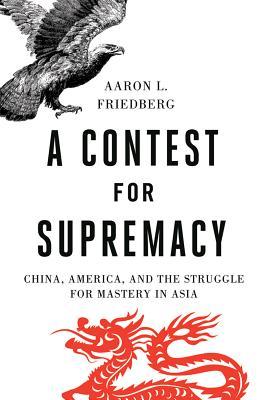 How far away in the future is China's predominance as a global power? Should you be worried about it, if you are American? This is a solid analysis of China-US relations and geo-strategic policies from both sides, very well articulated. If you want to go deeper into this topic, this book is a perfect start, as it also includes a useful overview of how this relationship has been evolving across the centuries and especially the last decades.
How far away in the future is China's predominance as a global power? Should you be worried about it, if you are American? This is a solid analysis of China-US relations and geo-strategic policies from both sides, very well articulated. If you want to go deeper into this topic, this book is a perfect start, as it also includes a useful overview of how this relationship has been evolving across the centuries and especially the last decades.The author's opinion belongs to the hawkish side of the house. I agree with many of his points, although at times his conclusions seem a little simplistic, and sometimes just wrong (see end of review as to why).
Aaron Friedberg criticizes the current US government's policy of "enhanced engagement" with Beijing. However, he is never truly convincing when bringing the reasons for his hawkish stance. A large portion of his argument is based on the fact that "Beijing has not yet made any progress towards democratization". He seems to put too much emphasis on this point, and despite acknowledging the possibility that China might turn out to be a very successful and internationally engaged country even without a western-style democracy (which is most likely), he keeps banging on this point as if he does not consider that possibility at all. I found that disappointing.
Friedberg wants the US to increase its military presence in the Western Pacific, and to consider China more as a rival than an ally. This is very confusing to me. In international relations, don't you always do both at the same time? Why should we see this as a black or white choice? He seems to give very little consideration to the fact that the world has changed (a lot) since WWII, and his tone often borders on the alarmist.
The book even has its own "baddies", and they actually have a name: they are the Shanghai Coalition, a loose group of lobbyists, corporate executives and other US investors who benefit from commerce with China, and therefore want to maintain the current status quo of peaceful engagement between the two countries. What they should do instead is unclear and, at best, totally impractical. Anyway, Friedberg paints them in the most negative light.
I always wonder if this type of book reflects solely the author's opinions, or if there is some other type of driving force behind it (like for example the Koch brothers being behind the Cato Institute and its publications). I say this because the book reads like an argument, rather than an objective analysis. Friedberg is trying to sell something to us.
In any case, aside from the author's own opinion, this is still a useful and interesting read, especially for someone like me who does not spend much time at all thinking of Sino-American relations. It was also interesting to hear about what Chinese analysts have to say. In particular, look out for Chapter 9, where Friedberg finally talks about "hard power", the most interesting part of the book.
Here is an excerpt from a NY Times review of this book, that I find myself in agreement with: "Friedberg takes issue with what he describes as the “Shanghai Coalition,” those in the United States who advocate engagement with China rather than containment, accusing them of self-interest or worse, and he mounts a fierce case for developing new military systems for projecting American power, including “long-endurance unmanned aerial vehicles, submerged or low-observable ‘arsenal ships’ loaded with precision weapons, long-range conventional ballistic missiles and perhaps a new intercontinental-range stealthy manned bomber.”
In addition to a more assertive approach to China, he calls for a new security framework in Asia that includes the United States, now largely excluded from regional organizations, and what he describes as a “community of Asian democracies” designed specifically to neutralize Chinese ambitions.
Essentially, Friedberg seeks to counter China’s rise in its own region by the deployment of hard power. This will inevitably lead to a more tense and dangerous international environment, quite possibly a new cold war. It is also highly doubtful whether it can be successful.
What the author seems to forget is that America’s problem, ultimately, is not military but economic, a point also made by Kissinger. If the Chinese economy, as projected, overtakes the American economy in about 10 years, and is almost double the size by 2050, then hawkish responses to China’s power are misplaced. Instead, two very different emphases are required. First, America must concentrate on economic regeneration, including huge expenditure on modernizing its infrastructure and education system. Second, it must come to terms with the fact that China’s rise and America’s decline are not just a result of a failure of policy, but are rather one of those massive and highly infrequent historical shifts that governments can do relatively little to affect, let alone prevent.
No comments:
Post a Comment